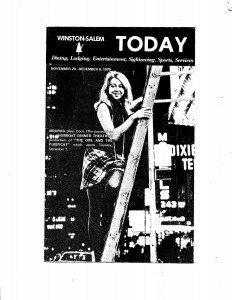Margarita Meyendorff (Mourka) In The News

Mourka in Times Square
“From royalty to refugee”
A review of DP Displaced Person by Violet Snow – Woodstock Times – Nov 17, 2016
“Now that millions of people are seeking refuge from the war-torn Middle East, it’s instructive to read DP Displaced Person (Baroness Publications, 2016), the memoir of a Hudson Valley resident who spent her early childhood in a refugee camp in Germany after World War II…” READ MORE
“Script in Hand, She Saved..And Stole The Show”
Charlotte Observer, Charlotte, North Carolina
Download Image
“ ‘LUV’ Quite A Show Showboat
Greensboro Weekender, Greensboro, North Carolina
Download Image
“Showboat Dinner Theatre production of “The Owl and the Pussycat”
Winston-Salem TODAY, Winston-Salem, North Carolina
Download Image
“She Is a Genuine Baroness”
Winston-Salem TODAY
Download Image
“Pathos and Humor Skillfully Blend”
Huntsville Times, Huntsville, Alabama
Download Image
“Artful Living is the Key to Understanding”
Poughkeepsie Journal
Download Image
“Major Merriment in Stone Ridge”
Daily Freeman
Download Image
“Mostly Mourka”
Woodstock Times
Download Image
“The Countess Recounts”
Woodstock Times
“Mourka at the 43rd Street Theatre”
Village Voice, NYC
Download Image
“Mohonk Festival of the Arts”
New York Times
Download Image
“From Russia with music, The Folk Instrument Ensemble”
Times-Herald Record
Download Image
“Recipe For Living”
Woodstock Times
Download Image
“Chekhov, Albee and Williams, Oh My!”
Woodstock Times
Download Image
“Film Shoot in Rosendale
Bluestone Press
Download Image
“A Russian Salon in Rosendale”
Bluestone Press
Download Image
Sanctuary Magazine:
https://www.sanctuary-magazine.com/dp-displaced-person.html
Daily Freeman Feature:
Mourka and the Russian Folk Instrument Ensemble to perform at the Rosendale Café
For most ethnic groups, New Year’s is decently far enough away to forget those well-intended resolutions.
However, on Saturday, a special performance by Mourka and the Russian Folk Instrument Ensemble at the Rosendale Café will herald the Russian New Year.
In an interview in her cozy, historic house in Rosendale, Mourka said the Russian Orthodox Church still adheres to the Julian calendar while most of the rest of the world observes the Gregorian calendar. Read More
SOUL TRAVELER
“Displaced Person” stirring tale of a creative life by Anne Pyburn Craig, Bluestone Press, 2016:
Being of “noble blood” sounds like it would be gravy, doesn’t it? Back in the days when people paid more attention to lineage, it was a common childhood fantasy to find out one was from an exalted family that would scoop one up into a trouble-free life of luxury. Well, imagine that the exalted lineage part was true…but that the nobility in question was the Russian variety, scattered by the Bolshevik revolution and displaced yet again by WWII? It has, after all, been a rough century for the nobility.
In her newly published memoir, “DP Displaced Person.” Rosendale’s own Margarita “Mourka” Meyendorff fills us in on the nitty-gritty of what that’s like in real life. Baron Meyendorff and his well-born wife, Rita, were forced from comfortable childhoods in Russia to Estonia, where they met and married. They then had to flee yet again, to a UN refugee camp in Germany, where Mourka was born. Two years later, the family was living among fellow expats in Nyack.
The very idea of Russian nobility carries a whiff of passion, drama and intensity, and the Baron and Rita had their share, which probably would have made for interesting lives even had they resided wealthy and undisturbed in Mother Russia. Combined with the dislocations of two wars, their issues developed subscriptions: Baron George who changed his first name to Baron on relocating to New York, could never quite accept that the relocation was permanent and had serious, recurring stomach trouble; Rita (short for Margarita) battled depression and anxiety. The family—Baron, Rita, Rita’s two sons from her first marriage, and young Mourka—moved around the Nyack area constantly, for reasons that were seldom explained.
Bright, creative people though they were—Baron was a talented artist, and Rita had a wonderful gift for nest-building in each new place—her parents were understandably exhausted much of the time, and it was an anxious, disjointed and lonely childhood. As Mourka writes, which she does lyrically and well, the reader is touched by a portrait of a gifted child who barely had a childhood at all. It was a strange blend of dead-broke hardships and high culture of repeated displacement interspersed with extended family and feasts among fellow White Russians.
And just as her parents’ lives were unsprung by the conniptions of Europe, that young girl would find herself caught up in the cultural conniptions of the latter half of the 20th century in the US of A. Gifted, intense, courageous in spite of herself, Mourka charted a tumultuous course of her own from place to place, buffeted by crisis after crisis, yet always, always drawn to perform and create. Way stations include a topless nightclub and a traveling children’s theater troupe, Minneapolis and Manhattan, sugar daddies and true loves.
Mourka doesn’t spare herself; she’s earned every battle scar, living proof that being smart and talented is no guarantee of anything until a human being claims her power and finds a way to be comfortable in her own skin. One chapter, “Absent,” recounts her self-assessed failings as a parent with a harsh honesty that’s rare and gleams like a gem.
Little by little, she begins to find the people, places and things that fit; only someone who doesn’t know the town would be surprised to hear that her battered, bright heart has found a home in Rosendale, where she is a much beloved force for good. It’s a journey well worth sharing and a tale well told, a survivor’s story about making one’s own birthright.